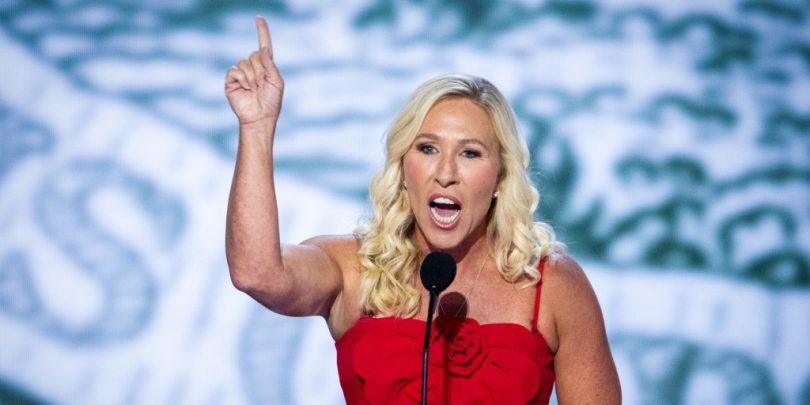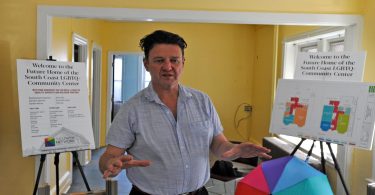Homophobic and transphobic remarks were unmistakably present throughout the first three days of the Republican National Convention in Milwaukee. At least a dozen speakers have so far mentioned gender or sexuality negatively in their speeches, according to an NBC News analysis.
Sen. Ron Johnson, R-Wis., kicked off the four-day event Monday with a speech loaded with anti-LGBTQ sentiment.
“This fringe agenda includes biological males competing against girls and the sexualization and indoctrination of our children,” Johnson said of the Democratic platform, which elicited boos in agreement from the crowd.
Johnson was followed by Rep. Marjorie Taylor Greene, R-Ga, on the stage.
“They promise normalcy and gave us transgender visibility day on Easter Sunday,” Greene said, referring to the fact that Transgender Day of Visibility — which is celebrated on March 31 annually — coincided with Easter this year.
North Carolina Lt. Gov. Mark Robinson, whose incendiary remarks about transgender people have been widely reported, was among the speakers at this year’s Republican National Convention.Chip Somodevilla / Getty Images
Party leaders then welcomed North Carolina Lt. Gov. Mark Robinson to the stage. Robinson made national headlines and faced calls to resign in 2021 after he described homosexuality and “transgenderism” as “filth.” While Robinson, who is now a candidate for governor, did not make anti-LGBTQ remarks from the convention podium, his record has been widely covered and former President Donald Trump has endorsed him.
Much of the anti-LGBTQ rhetoric at the convention singled out the transgender and nonbinary communities.
“We were richer, inflation was low, and there were two genders,” Rep. Matt Gaetz, R-Fla., said on the convention’s third night, referring to the country during the Trump administration.
Trump’s eldest son, Donald Trump Jr., similarly accused the left of “teaching our kids that there are 57 genders” and said it “can’t even define what a woman is.”
Donald Trump Jr. accused the left of “teaching our kids that there are 57 genders” in his convention speech Wednesday night.
Andrew Harnik / Getty Images
Conversely, several of the convention’s speakers, including RNC co-chair Lara Trump, the former president’s daughter in law; American model Amber Rose; and Trump’s former acting director of national intelligence, Richard Grenell, tried to appeal to gay Americans.
“Donald Trump doesn’t care if you’re gay or straight, Black, brown or white, or what gender you are,” said Grenell, who is gay and also served as the U.S. ambassador to Germany in the Trump administration. “He knows that we are all Americans and that it’s time to put America first.”
Yet the speed and breadth of the anti-LGBTQ remarks at this year’s convention, and the lack of condemnation the rhetoric has received, underscore how the once-extreme language targeting the community — particularly trans people — has become widely embraced by today’s Republican Party.
“The rhetoric is extreme if we compare it to not just the Republican Party a few years ago but, for instance, conservative parties in other countries,” said Gabriele Magni, an assistant professor of political science at Loyola Marymount University in Los Angeles and director of the school’s LGBTQ Politics Research Initiative.
At the Republican convention in 2020, there appeared to be less than a handful of speakers who used anti-LGBTQ rhetoric. Only Cissie Graham Lynch, the granddaughter of late evangelical pastor Billy Graham and daughter of evangelist Franklin Graham, appeared to make news when she referred to transgender girls as “boys” in her speech.
In the time between the two conventions, much has changed, including an update to the official GOP platform, a wave of anti-LGBTQ state bills and the resurgence of incendiary anti-LGBTQ rhetoric in many conservative outlets.
The new GOP platform — released this month — removed language that explicitly defined marriage as being between “one man and one woman” for the first time in decades. However, it outlined how Republicans “will promote a Culture that values the Sanctity of Marriage,” which raised questions about whether the party remains opposed to same-sex marriage, which has been legal across the U.S. since 2015.
The platform, also for the first time, called for banning trans people from competing in sports that align with their gender identities, prohibiting using taxpayer dollars to fund transition-related surgery and undoing new Title IX protections for LGBTQ students.
Thousands of anti-LGBTQ bills have been put forth in state legislatures across the country, and dozens have been enacted. This year alone, state lawmakers have introduced 527 anti-LGBTQ pieces of legislation, according to a tally from the American Civil Liberties Union.
Simultaneously, hostile language that had long been relegated to the margins resurfaced among conservative lawmakers, pundits and right-wing sections of social media.
Florida Gov. Ron DeSantis, pictured signing his state’s so-called Don’t Say Gay bill in 2022, was a prime-time speaker at the convention. Douglas R. Clifford / Tampa Bay Times via AP
Anti-LGBTQ rhetoric was fueled after Florida Gov. Ron DeSantis enacted the state’s so-called Don’t Say Gay law in 2022. The law — which at first prohibited the instruction of sexual orientation or gender identity in kindergarten through third grade before it was expanded to higher grade levels — prompted a wider debate about whether LGBTQ identities, history and people were age-appropriate for children.
Since then, DeSantis and other conservative lawmakers have accused Democrats of “grooming” or “indoctrinating” the nation’s children. The words have long been associated with mischaracterizing LGBTQ people, particularly gay men and trans women, as pedophiles.
DeSantis, who unsuccessfully challenged Trump in the GOP presidential primaries, repeated the language when he spoke at the convention’s second night Tuesday.
“They want to ban gas automobiles, eliminate Second Amendment rights and impose gender ideology on everyone from our infantrymen to kindergartners,” he said. “They stand for DEI, which really means division, exclusion and indoctrination.”
Charles Moran, president of the Log Cabin Republicans, an advocacy group that represents LGBTQ Republicans, defended some of the rhetoric in an interview with NBC News from the convention this week. His defense appeared to further illustrate how the right’s anti-LGBTQ rhetoric is largely aimed at trans people or policies involving trans people, and not the entire LGBTQ community.
“Don’t confuse the commitment to parental rights and traditional biological gender issues as being something homophobic,” Moran said. “We know that most of this country agrees [with] protecting women’s spaces, preserving women’s sports, ensuring parental rights on every level and really looking at the issue of gender transition under the age of 18. These are commonsense issues.”
Moran added that his group was “working with the Republican Party to message these things” and ensure religious freedom and liberty.
Trump will give his keynote speech Thursday night to cap off the convention.
Asked whether Trump would address LGBTQ issues in his speech, campaign national press secretary Karoline Leavitt said he “continues to fight and win for all Americans.”
“President Trump is leading the most diverse political movement in history,” Leavitt said in a statement. “It’s disappointing to see the divisive hateful rhetoric coming out of the Democrat Party while President Trump talks about bringing our country together and making life better for Americans.”
Though he has been advocating for national unity since he survived an assassination attempt Saturday, in recent years he has referred to trans women competing in women’s sports as “men” and equated transition-related care for minors with “mutilation.”
For more from NBC Out, sign up for our weekly newsletter.







